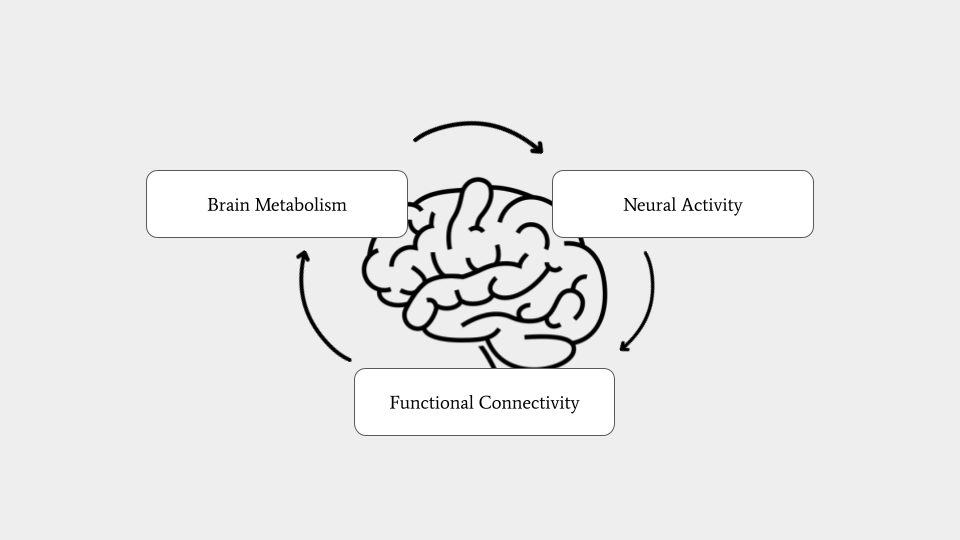Despite its small size compared to the rest of the body, the human brain consumes a lot of energy, consuming about 20% of the body’s resources. This energy is vital for maintaining the brain’s complex functions such as thinking, memory, and controlling the body. Neuroenergetics is a specialized area of research that aims to understand how the brain manages this energy.

The three pillars of neuroenergetics
Neuroenergetics connects brain function with its energy demands. It’s the study of how the brain produces, distributes, and uses energy. You can think of neuroenergetics as studying the brain’s budgeting system, similar to how one might manage a financial budget, prioritizing certain activities and functions. This approach helps us understand how the brain uses its limited energy for maximum benefit.
And, just like in financial budgeting, sometimes this energy allocation can go awry, leading to deficits or inefficiencies that might contribute to various neurological or mental health disorders. Neuroenergetics aims to understand both the efficient management and potential mismanagement of the brain’s energy resources. Specifically, researchers investigate:
1. Energy Production: This involves how the brain cells, or neurons, produce energy. Neurons are highly active cells that require a constant supply of energy. This energy is primarily produced through oxidative phosphorylation, a process similar to what happens in other body cells, where glucose and oxygen are used to produce ATP (adenosine triphosphate), the main energy molecule.
2. Energy Distribution: The brain has a unique way of distributing energy. Unlike other cells in the body, neurons have long extensions (axons and dendrites), and they need to transport energy efficiently to these distant parts. Understanding how energy is transported and distributed in neurons is a key aspect of neuroenergetics.
3. Energy Usage: Neurons use energy for various functions, like transmitting signals, maintaining the balance of ions across their membranes, and synthesizing neurotransmitters and other molecules. Neuroenergetics examines how energy is utilized for these critical tasks.
Researchers in neuroenergetics also look at how changes in brain energy metabolism can affect health. For example, in conditions like Alzheimer’s disease, the brain’s ability to use glucose is impaired, which affects its function.
The ultimate understanding of the brain
Neuroenergetics is based on the idea that the deepest understanding of brain activity is achieved when it’s broken down into electrochemical processes. As biophysicist Robert Shulman explains: “We have reached the ultimate in understanding brain activity when it is expressed in its different components of action potentials and energy consumption which are describable in measurable chemical terms of the phenomenon.”
Specifically, neuroenergetics is based on key assumptions that drive research questions:
- The laws of physical science can be applied to biological phenomena, including brain function.
- The brain’s functions are intrinsically tied to its energy consumption and metabolism.
- Understanding brain activities involves dissecting these into elementary electrical, chemical, and structural processes.
Those assumptions serve as the foundation for questions such as: How does the brain produce and distribute energy, particularly how it metabolizes glucose and oxygen? How are different brain states related to energy consumption? How do changes in energy metabolism affect brain health and function, especially in neurological disorders? What are the electrochemical bases of brain activities traditionally described in psychological terms, such as consciousness and memory?
For instance, neuroenergetics approaches consciousness by linking it to observable brain energy levels. It suggests that high global brain energy levels are necessary to maintain a state of consciousness, and that changes in energy levels, such as during anesthesia, sleep, or coma, correlate with changes in consciousness states. This approach provides a more concrete, measurable basis for studying consciousness, focusing on electrochemical processes in the brain rather than abstract concepts.
Another promising area of research is the impact of alcohol consumption on brain energy metabolism. By using a new method for combining measures of brain activity and glucose consumptions, scientists have found that heavy drinking shifts the brain toward less efficient energetic states.
Finally, neuroenergetics also studies how brain energy relates to mental health issues. Harvard psychiatrist Dr. Chris Palmer discusses this in his book Brain Energy, where he argues that problems with how the brain uses energy could be linked to many disorders including anxiety, depression, ADHD, alcoholism, eating disorders, bipolar disorder, autism, and schizophrenia.
Neuroenergetics is a promising field of research. By focusing on how the brain uses energy, it can provide deeper insights into the workings of the brain and opens up new possibilities for treating mental health disorders and other brain-related conditions.
